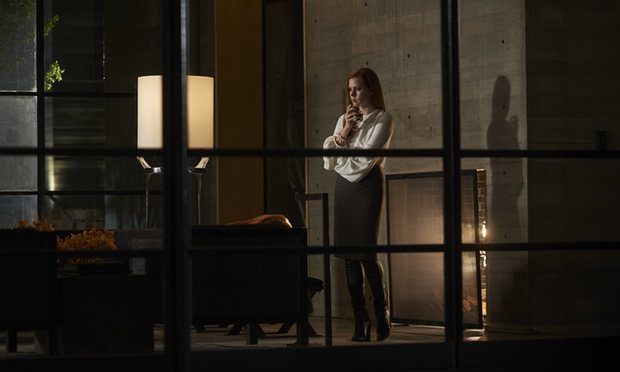You have no items in your cart. Want to get some nice things?
Go shopping
Austin Wright’s Tony & Susan didn’t make much of a splash when it was first published in the US in 1993. The novel focuses on the circumstances of an estranged couple, Susan and Edward, and the unpublished manuscript Edward sends Susan years after their divorce. The manuscript – which we read over Susan’s shoulder – is startlingly violent. It is the story of a family broken up by force, and the lengths to which a father will go to seek justice for what has been done to his wife and daughter. The central themes of betrayal and revenge were a touch too pulpy, reviewers thought. But there was a cleverness in this story-within-a-story, a comment on the relationship between reader and writer, which people began to react to. Saul Bellow deemed it “marvelously written”, and its publication in the UK in 2010 was met with enthusiasm.
And now it has been adapted for the screen by Tom Ford, taking the name of Edward’s manuscript – “Nocturnal Animals” – as its title. Nocturnal Animals is largely faithful to Tony & Susan, reviving its many-stranded structure, but gives the story a sheen the original lacks. The Fordian trademarks we first saw in A Single Man are here again. The impressionistic shots which punctuate the narrative. The starry cast who toe the line – as Colin Firth did so memorably in A Single Man – between elegance and anguish. The plaintive strings.
Yet the film’s stylisation doesn’t detract from its emotional impact. There’s loneliness in the way Susan (played with poignancy by Amy Adams) navigates her ultra-modern house and the circus of the art world in which she works. There’s warmth in her first exchanges with Edward (both Edward and the manuscript’s main character, Tony, are played by Jake Gyllenhaal), conveyed through a series of flashbacks. And there’s horror in the scene in which Edward’s fictional family are shoved off the road and antagonised by a car full of young men, an interchange both unexpected and extremely disturbing. This episode leans heavily on the example of Michael Haneke’s Funny Games in its teasing sadism. Like Funny Games, Nocturnal Animals toys with its viewers, allowing snuffed-out moments of hope (a passing police car; a fixed flat tire). As observers, we uneasily surrender our control: not only do we find our expectations continually thwarted, but our reactions to the events we witness are further influenced by the example of Susan, who is reading and reacting alongside us.
This tussle for authorial control is the film’s most distinguishing feature. It occurs from the opening credits, in which we see a slow-motion montage of overweight women dancing, the abundance of flesh a jarring contrast to the lean bodies which inhabit the rest of the movie. The camera’s unflinching relish in the women’s size is disquieting. But as the narrative unfolds, and this footage is located in a contemporary art gallery in LA, we – as spectators – take a step back. It’s not Ford who is making a spectacle of these women, but the sharply dressed art enthusiasts in his film; our judgement, we are forced to believe, was misdirected. Throughout the film, our viewing experience is repeatedly manipulated. We are never sure what to expect.
This is Austin Wright’s great, and largely unrecognised, skill, and it is one which informed his academic writing too. In 1990, he wrote Recalcitrance, Faulkner and the Professors, a piece of so-called “critical fiction” which explores the language and attitudes of literary criticism through a satirical lens. The book is set at an imaginary university, its characters voicing conflicting opinions on Faulkner’s As I Lay Dying in discussions “documented” by Wright, and it has been praised as an example of both experimental fiction and innovative critical discourse. There are a number of interesting things about this confluence of academic writing and metafictionality, but the most interesting, to my mind, is the idea of control. By feeding arguments and counter-arguments into the mouths of his characters, Wright creates for himself a position of authorial power, anticipating and addressing the criticism of his readers before the criticism can be made.
Nocturnal Animals revives Wright’s interest in control. A struggle for power is evident in the exchanges between present-day Edward and Susan and the Edward and Susan of yesteryear. It is realised distressingly vividly in the assertion of the men’s power over Tony’s wife and daughter, and Tony’s attempt to reclaim that power in his bid for revenge. And we feel it in our lack of control as viewers, as we draw conclusions which are repeatedly proved wrong. The film’s subject matter and style complement each other in this respect, and for this reason Nocturnal Animals is a more successful movie than Ford’s A Single Man. The overwroughtness of A Single Man jarred with many of its critics when it was released; The Telegraph called it “a preening perfume commercial”, while The Guardian deemed it “absolutely just so”. Ford’s precision eclipsed the narrative itself, reviewers felt. But the framework he inherits from Wright is the perfect match for his directorial style, its story-within-a-story requiring the kind of close supervision at which he excels.

About Xenobe Purvis
Xenobe is a writer and a literary research assistant. Her work has appeared in the Telegraph, City AM, Asian Art Newspaper and So it Goes Magazine, and her first novel is represented by Peters Fraser & Dunlop. She and her sister curate an art and culture website with a Japanese focus: nomikomu.com.





I suggest you to watch this movie on tea tv app.
I really love your work, it’s just awesome buddy. Thanks for sharing.
Worth of reading this stuff, I was searching for this kind of post from a ling time.
Nowadays this is a big deal and thanks to you for the share.
Got the best novel to read in leisure time.